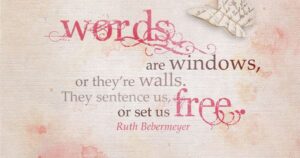
Words Are Windows (or They’re Walls) by Ruth Bebermeyer.
I feel so sentenced by your words,
I feel so judged and sent away,
Before I go I’ve got to know,
Is that what you mean to say?
Before I rise to my defence,
Before I speak in hurt or fear,
Before I build that wall of words,
Tell me, did I really hear?
Words are windows, or they’re walls,
They sentence us, or set us free.
When I speak and when I hear,
Let the love light shine through me.
There are things I need to say,
Things that mean so much to me,
If my words don’t make me clear,
Will you help me to be free?
If I seemed to put you down,
If you felt I didn’t care,
Try to listen through my words,
To the feelings that we share.
Source: Nonviolent Communication: A Language of Life: Life-Changing Tools for Healthy Relationships by Marshall B. Rosenberg
There are many great books out there, I’ve quoted many of my favourites before now. Nonetheless a book needs to arrive at the right time to be of value. This book arrived after a couple of weeks of coaching around negotiation, sometimes with quite strong characters.
One perennial challenge we address in coaching is communication: how to deliver a difficult message, how to engage the other party, how to negotiate an agreement. And always we talk about taking each of 3 positions: our position, the other party’s position and a helicopter view. One skill of great negotiation is to move around these positions during conversation. First to evaluate my own position, then the other’s position and then to consider the direction the conversation is heading.
The challenge here is to understand the other’s perspective, “Seeking first to understand, before being understood” (Steven Covey 7 Habits of Highly Effective People). Because the greatest skill in negotiation and communication is to understand precisely what the other party is saying. Two ears and one mouth, as my good friend Jim Fitzgerald used to say: “there’s a good reason God gave you two ears but only one mouth”. A good listener finds that arguments dissipate in front of them, prejudices get reflected and relationships bolster.
We use great tools like DISC profiling (see https://www.assessments24x7.com/assessments/disc) to determine how we communicate with the world around us, but how often are we truly honest in those communications? I’m really enjoying learning more about Non-Violent communication (the violence reference is about language, not physical violence).
The value of being able to break down a conversation into the trust, the prejudices and the languaging all reflect back into “Identity Iceberg” that we all love in ActionCoach.
If we then look to expand that into the new skill sets to communicate clearly how we feel, we suddenly understand how supercharge our communication, or relationships and our effectiveness.
Finally I Iove the candour of the author who makes it clear the he frequently fails to use his own tools to communicate! Its always important to remember that we are all human, we can’t be excellent all the time. Even with a name like Marshall B Rosenberg PhD.





